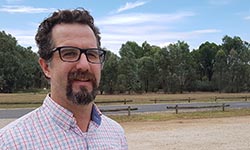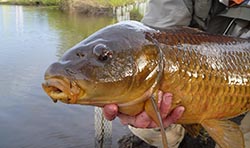 Virologists and ecologists, including a Charles Sturt University (CSU) expert, call for a demonstration of effectiveness and safety before the Australian Government releases a herpes virus to control exotic common carp.
Virologists and ecologists, including a Charles Sturt University (CSU) expert, call for a demonstration of effectiveness and safety before the Australian Government releases a herpes virus to control exotic common carp.
Dr Keller Kopf, a researcher with the CSU Institute for Land, Water and Society, believes that great care must be taken before the proposed introduction of the Koi Carp herpes virus (CyHV-3) into Australia’s inland waterways to reduce carp numbers.
The expert team from Belgium, the UK and Australia expressed their new concerns in a letter released today in the prestigious journal Science.
Listen to Dr Kopf
Loading...
 Dr Kopf said,
Dr Kopf said,
“There is no doubt that carp negatively affect water quality and some native fish species in Australia.
“However, we don’t know whether the virus can provide effective and safe carp control in Australian conditions. While it sporadically kills carp in lakes and rivers overseas, resulting in short-term environmental and water quality damage, there is little evidence to show that the virus provides long-term population control.”
“The virus is not effective at certain water temperatures, and evidence from Japan shows that after initial massive carp deaths in 2004, surviving (immune) carp re-populated the waterways with no apparent ill-effects.
“In addition, evidence suggests that the virus evolved thousands of years ago, well-before carp were introduced into Australia. The virus may already be here.
“We advocate the need for bold action on safely managing invasive species in Australia. However, before releasing the virus in Australia, we need to see evidence that CyHV-3 is not already here.
“We also recommend setting up small, contained field trials to safely evaluate whether the virus can actually control populations of free living Australian carp without harming ecosystems, native species and drinking water.”





Social
Explore the world of social